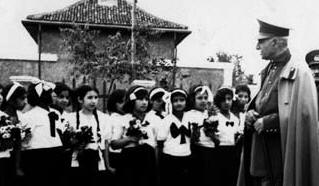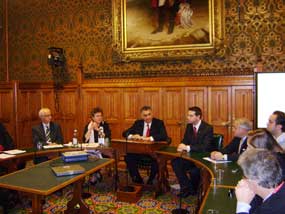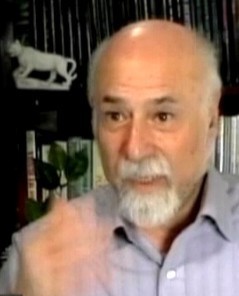
The Iranian regime’s role in fueling radicalism in the Middle East and its part of responsibility for the recent war in Gaza and the misery and heavy casualty of its innocent people, merits studious and objective scrutiny by the experts. Nevertheless, the pro-Iranian advocates in Washington have taken a different path, and attempt to wash Iran’s hands of any connection or wrongdoing in the region. More shockingly, they try to exploit this new round of bloodshed to justify the future impasse in US overture toward Tehran.
A case in point is the recent article “ Israel, Gaza and Iran: Trapping Obama in Imagined Fault Lines” in Huffington Post of January 13th by Trita Parsi.1 The governmental press in Tehran has called Parsi and his organization NIAC (National Iranian American Council) as the “Iranian lobby in Washington”.2 - Parsi’s article is a clear example of how pro-Tehran advocacy groups in Washington have pursued two simultaneous goals: to portray the Iranian regime as a victim rather than partly responsible for the Middle East turmoil and to present Israel as the main entity responsible for the impasse in Iran-US relations. In fact, they have “used” the Israeli decoy as an important part of their overall campaign to lift the pressure off the Iranian regime. Parsi’s article starts with a harsh attack against those who believe that the war in Gaza has been part of a regional battle between Iran and Israel:“In talking about the assault on Gaza, neo-conservative pundits and Israeli hardliners have relied on a familiar frame. The fighting in Gaza, they say, is a struggle between Israel and so-called “moderate” Arab states (namely, Egypt, Jordan and Saudi Arabia) on the one hand, and Iran, Syria, Hezbollah and Hamas on the other. In reality, Israel is fighting Iran in Gaza, the argument reads. These imagined Manichean fault lines defy logic and reality.”Judging by Parsi’s criteria, a large number of respected politicians and analysts would fall into the neo-conservative camp. Richard Haas, the president of the Council on Foreign relations has recently wrote in Newsweek about the Gaza fighting: 3-“What will Israel have accomplished then? … Iran, the principal patron of both Hamas and Hizbullah and the greatest regional threat to Israel, may no longer think Israel is a helpless giant.”Joschka Fisher, the former pragmatist and moderate foreign minister of Germany who was a part of dealing with Iran in the past several years has called the Gaza fighting a “second Israel and Iran war”.4 The first according to Fischer was the 2006 Lebanon war against Hezbollah. This view is also shared by the Iranian leaders themselves. Ali Larijani the speaker of Iranian parliament could not be clearer about it. In a briefing about the recent fighting in Gaza he declared: 5 “The Gaza fighting was a plot by the West and the Arab countries against Iran but it was defeated. They wanted to counter the Iranian influence in the region and were thinking that by attacking Gaza would cut one of the Iranian hands in the Middle East. “A good part of Parsi’a article is about acquitting Tehran from the “allegations” of material support to Hamas and praising the Islamic regime for its restraint from launching Hezbollah into the war. At a time when many journalists inside Iran brave the regime’s red lines and publicly condemn the Iranian government financial, military and diplomatic support to Hamas and Hezbollah, Parsi categorically denies such support and prefers to write in defense of the Iranian regime’s advocate.However, Parsi’s article goes far beyond a simple appeal in favor of the Iranian regime. It is a bout the essence of his twelve years campaign to portray Israel as a burden for US and the real cause of American dilemma in dealing with Tehran.Parsi starts by telling that both Iran and the US are the victims of this Israeli provoked hostility: “Rather than benefiting from the instability following the slaughter in Gaza, Iran stands to lose much from the rise in tensions. And so does Obama.”According to Parsi, Iran is waiting for future negotiations with US and welcomes Obama’s overture and therefore the Israeli attack is reducing such prospect:“This conflict is the last thing Tehran would have wished for in the last few weeks of the Bush administration. It increases the risk of a US-Iran confrontation now, and reduces the prospects for US-Iran diplomacy once President elect Obama takes over - neither of which is in Iran’s national interest”After all these introductions, Parsi arrives at his point and writes that Israel’s main objective in launching the “Gaza slaughter” is to destroy any prospect of Iran-US rapprochement:“Increased tensions and polarization in the Middle East undermines Obama’s ability to pursue a new policy towards this region, including a shift in America’s 30-year old policy of isolating Iran. In fact, polarization along the imagined Gaza fault lines - and a misleading equation of Hamas with Tehran - traps the incoming Obama administration in an involuntary continuation of the Bush policies that contributed to the increased instability in the Middle East in the first place. From the vantage point of Israeli hardliners, this may be a welcomed outcome since it will make compromise with Tehran more difficult and pressure on Israel less likely.” However, Parsi’s main message is clear. He tries to present Israel and its supporters as a major cause of US-Iran hostilities. This has been the central part of Parsi’s activities for the Past twelve years. It is not a coincidence that his doctoral thesis and his only book are focused on Israeli. 6- Trita Parsi’s campaign line is simple and efficient; There is no fundamental clash of interests between Iran and US, there is no justification for US hostility toward Iran, the Iranian regime has always been ready to reach an agreement with the US, and the US according to Parsi “has refused to start a dialogue with Iran for the past 26 years.” 7. The main reason behind US hostilities and refusal to engage Iran, he says, is Israel.According to Parsi, the Israeli campaign to “force” the US administration not to engage Iran started in early 1990s: 8- “From the early 1990s, Israel consistently failed to appreciate the opportunity American-Iranian negotiations could provide in alleviating the Iranian threat to the Jewish state. Rather, Israel saw such dialogue as a greater danger than Iran’s anti-Israeli activities, fearing that Washington would betray Israeli security interests once faced with the opportunity to make up with Tehran.” Parsi even goes as far as blaming Israel for provoking Tehran to support the Palestinian factions to terminate the peace process: 8- “In late 1992, the Rabin-Peres government broke with the “periphery doctrine” that had long guided Israeli foreign policy… and began depicting Iran as a global and existential threat, in the hope that the West would come down hard on Tehran… But rather than winning the attention of the West, Israel only made itself shine brighter on the Iranian radar, prompting Tehran to significantly toughen its stance on Israel and patch up its ideological differences with Palestinian Sunni-Islamist groups.” Parsi’s “blame Israel” attitude found fertile ground in 2006 when the Iranian nuclear program became the center of international attention. For Parsi, the unified international reaction to the Iranian nuclear ambitions is simply baseless and this “sudden and unjustified” world focus on Iran should be blamed on Israel. He wrote in 2006: 9-“For more than 14 years, Israel has been the primary force countering Iran’s nuclear advances. Though Israel presents the prospect of a nuclear Iran as a global rather than an Israeli problem, it has compelled Washington to adopt its own red lines and not those of the non-proliferation treaty (NPT)…Under these circumstances, US-Iran negotiations could damage Israel’s strategic standing, since common interests shared by Iran and the US would overshadow Israel’s concerns with Tehran and leave Israel alone in facing its Iranian rival….Israel is playing hardball to prevent Washington from cutting a deal with Tehran that could benefit America, but deprive Israel of its military and strategic supremacy.”According to Parsi, the UN Security Council’s decision to take the Iranian nuclear dossier is also a “work” of the Israeli lobby: 8-“With the issue of Iran’s nuclear program being taken up by the U.N. Security Council, Israel’s hawkish policy and AIPAC’s support for Bush administration hard-liners would appear to be paying dividends.”The problem with Parsi’s vision is simple: it contradicts the reality. The US has always been trying to open a dialogue with Iran and the Iranian regime has always escaped such a “horrific” prospect. This Iranian refusal has been repeatedly admitted by the highest American politicians who were personally involved in the dealing with Tehran. The Secretary of Defense Robert Gates recently made a speech at National Defense University on September 29 and said: 10-“Every administration since 1979 has reached out to the Iranians in one way or another and all have failed. Some have gotten into deep trouble associated with their failures, but the reality is the Iranian leadership has been consistently unyielding over a very long period of time in response to repeated overtures from the United States about having a different and better kind of relationship.” On 23 November 2004, Kenneth Pollack (Director for Persian Gulf affairs at the National Security Council under President Clinton) told the Saban Center:“In the Clinton Administration in 1999 and 2000, we tried, very hard, to put the grand bargain on the table. And we tried. We made 12 separate gestures to Iran to try to demonstrate to them that we really meant it, and we were really willing to go the full nine yards and put all of these big carrots on the table if the Iranians were willing to give us what we needed. And the Iranians couldn’t.” Similarly, blaming Israel and Rabin-Perez for the start of hostilities with Iran, the reality is again different from Parsi’s vision. Hooshang Amirahmadi was Trita Parsi’s boss in 2001. Amirahmadi is the president of American Iranian Council. In March 2000, the Secretary of State Madeleine Albright accepted AIC’s invitation and made an important speech of overture toward the Iranian regime. Amirahmadi had a very interesting interview with radio Farda, a US financed Farsi radio about this speech. He declared: (Gooya News from radio Farda, 11.4.2004)
“After her speech I talked with Thomas Pickering, who was Albright’s under-secretary and was also US ambassador to Israel. I asked him whether Clinton was really serious to normalize relations with Iran. Pickering was absolutely positive. Then, I asked him about Israeli position. Pickering declared that US was informing Israel about our decision and Isaac Rabin, just before his assassination (11.1995), sent a message to Clinton and told that sooner you normalize relations with Iran, better it would be for Israel.”
Translating vision into action
Why should Parsi put Israel at the center of his campaign? It could probably assist the Iranian regime to leave the accused bench and to sit on the victim seat. This makes it more difficult and more costly for US administration to pressure Iran. It could also help to attract the American peace groups and all those who remain suspicious of US foreign policy since the invasion of Iraq and the WMD allegations.Naturally, Parsi has translated his “blame Israel” vision into an action slogan for his advocacy activities in Washington. He has framed his action as a battle with the Israeli lobby AIPAC. In 1997, while a young student living in Sweden, he started a small lobby group called “the Iranians for International Cooperation” (IIC). In his first statement he named AIPAC as its main target:11-“We realized it was time for Iranians in the West to use their voice and power in the U.S. and Europe to influence decision makers in the West in order to help the people of our own nation. So far, only the Mojahedin Khalq Organization, Kenneth Timmerman’s pro-Israeli FDI (Foundation for Democracy in Iran) and the American Israel Public Affairs Committee (AIPAC) had been active in influencing Iran issues on Capitol Hill.”Parsi and the former Congressman Bob Ney fought hard to lift the sanctions against the Iranian regime and their combat reached its climax in 2001 when the Iran-Libya Sanctions Act (ILSA) came back to the Congress for renewal. They were defeated and ILSA was extended for five more years.Parsi was explicit and blamed the passage of ILSA on Israel alone. He claimed that Israeli lobby “forced the Congress to pursue a policy that contradicts US interest.” In a tone apologetic to Tehran, he expressed his hope that the Iranian regime understood that he and his colleagues had worked hard to prevent this result: 12-“Hopefully, Tehran will recognize that an honest attempt was made to defeat or at least weaken the sanctions… In the Senate, the vote was 96 in favor and only two against. In the House, 409 Congressmen favored an extension whereas six opposed it; but these numbers neither reflect the mood in Congress nor the difficulties the Israeli lobby had to overcome in order to force Congress to pursue a policy that contradicts US interest.”Ney harshly criticized the US administration for the failure of opening up the dialogue with the Iranian regime and blamed Israel: 13-“I serve this country and no other. So, therefore, if another country does not like Iran, it doesn’t mean that we don’t talk to Iran. I’m very tired of hearing Iran doesn’t get along with this country or that country. We know that. We don’t particularly get along with Iran. But I don’t want to hear from other countries dictating our policy of who we deal with.”Parsi’s fight to save Iran-US relations from the grips of Israeli bullying machine reached a “historic” turn in the summer of 2008 when the H.R. 362, an advisory resolution which was asking more sanctions on Iran came to the Congress. This resolution was finally shelved by the Congress. In an epical tone, Sasan Dehghan, a NIAC’s prominent member compared NIAC to “David” and portrayed the Israeli lobby as “Goliath”:15 -“NIAC beats AIPAC-It was David versus Goliath: the classic underdog match up. In the battle over a Congressional resolution calling for war with Iran, the lines were drawn between the smaller grassroots Iranian-American movement (NIAC) on one side and the hawkish American Israel Public Affairs Committee (AIPAC) mega-lobby on the other…Led by the National Iranian American Council (NIAC) and a coalition of peace and security groups, Iranian Americans from around the country called, emailed, wrote, and visited their members of Congress…”Parsi’s twelve years old campaign has arrived at a turning point. It is largely predicted that Obama will reach out to Tehran. Many believe that the Iranian regime will not respond positively. This could eventually bring more pressure on Iran.Parsi’s efforts to signal Israel as being the responsible for the impasse in US-Iran relations is more than welcome by Ayatollahs in Tehran. The Iranian regime has already started to burn Obama’s picture in Tehran. It will only need more time to portray him as an Israeli puppet.

















































































































No comments:
Post a Comment
Thank you for your comment. This comment will be posted after it has been modarated by the editor.